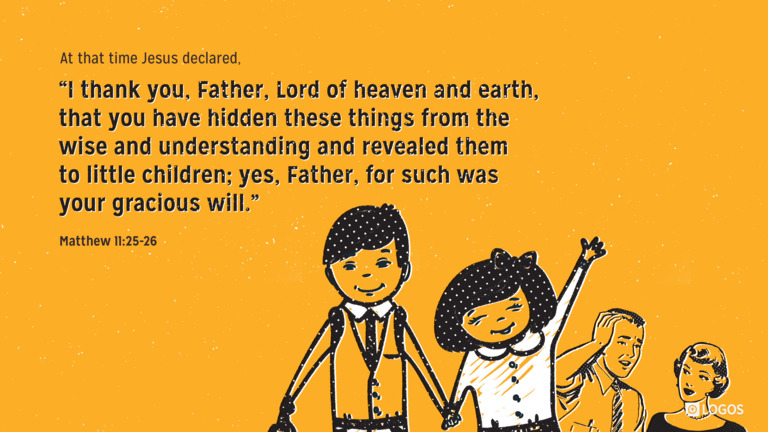Daily Verse Matthew 11:25-26 | Daily verse by Faithlife
- Thread starter SC Facilitator
- Start date
You are using an out of date browser. It may not display this or other websites correctly.
You should upgrade or use an alternative browser.
You should upgrade or use an alternative browser.
Matthew 11:25–26 The scribes and Pharisees who rejected Jesus would have been recognized as “wise and understanding” (v. 25; see also Isa. 29:18) according to the prevailing standards of their society. Paradoxically, the metaphorical “little children”—people whom society considered unimportant—were more responsive to God’s revelation of his merciful and gracious character than the learned. Later in Matthew’s Gospel, Jesus will say that unless a person turns and becomes like a little child, he or she cannot enter the kingdom of heaven (Matt. 18:3). Entry into the kingdom involves understanding that one is wholly dependent upon God for salvation, just as a little child is wholly dependent for life and health upon loving adults.
Paul makes the same point with respect to the cross of Christ in 1 Corinthians 1:18–2:8. God used the cross to bring atonement for the sins of those who believe the gospel (Rom. 3:21–26; 2 Cor. 5:19–21; Gal. 3:13), but society viewed the cross as an instrument of pain, death, and defeat. The idea of saving people through the crucifixion of Jesus seemed like folly to those too fascinated with sinful worldly wisdom to accept the humbling truth that they were sinners in need of the atonement provided by this shameful death (1 Cor. 1:18, 21; 2:8). It was mainly those who were not “wise according to worldly standards” or “powerful” or “of noble birth”—the “foolish in the world”—who embraced the gospel when Paul preached it (1 Cor. 1:26–30).
Frank Thielman, “Matthew,” in Gospel Transformation Bible: English Standard Version, ed. Bryan Chapell and Dane Ortlund (Wheaton, IL: Crossway, 2013), 1285–1286.
Paul makes the same point with respect to the cross of Christ in 1 Corinthians 1:18–2:8. God used the cross to bring atonement for the sins of those who believe the gospel (Rom. 3:21–26; 2 Cor. 5:19–21; Gal. 3:13), but society viewed the cross as an instrument of pain, death, and defeat. The idea of saving people through the crucifixion of Jesus seemed like folly to those too fascinated with sinful worldly wisdom to accept the humbling truth that they were sinners in need of the atonement provided by this shameful death (1 Cor. 1:18, 21; 2:8). It was mainly those who were not “wise according to worldly standards” or “powerful” or “of noble birth”—the “foolish in the world”—who embraced the gospel when Paul preached it (1 Cor. 1:26–30).
Frank Thielman, “Matthew,” in Gospel Transformation Bible: English Standard Version, ed. Bryan Chapell and Dane Ortlund (Wheaton, IL: Crossway, 2013), 1285–1286.

